4. Diverse and effective experiences with Adiyar
The case of Adiyar was even more different from the other ones because :
– he is not a kid, but a 22 y.o. student ;
– at first, he was coming to enjoy the summer camp, like the other children, but after some time, he came back as a “volunteer”, like the other young instructors ;
– he accepted to become the first “Ambassador of Autistan” ;
– I helped him by making “social experimentations” in the city (Almaty) ;
– and we continued these experiences in Spain.
4.1. Adiyar as an “older child”
After one first day in the summer camp, when I asked him his impressions, he told me “I just want to go home”…
The reasons that he was not really knowing what he was doing there, and also the fact of being far from his family and habits, and also, of course, the fact of being the only young adult, in the middle of children (the age of the camp was 6-18).
But he participated simply in the activities, and little by little, day after day, I saw him more and more relaxed and happy and socializing, especially with the young volunteers (the “instructors” of the kids).
In the beginning, he had sometimes some “strange” behaviours (like agitating his hands), but much less at the end.
During the last few days, I heard him laughing many times and also singing several times.
I also tried to discuss with him the problem that he usually encounters as an autistic, but he was not so keen to talk about that, so I just tried from time to time, waiting for him to be more prepared and willing for that.
4.2. Adiyar as a volunteer (“instructor”)
One or two days after having left the camp, Adiyar and his family understood that he was quickly going “back to the old routines and habits” in his home, and apparently, he felt that the “change” was beneficial for him. In fact, he had “tasted” something like “new overtures or possibilities”, and this was “attracting him”. The “little change” in the summer camp, associated with all the “autism-friendy” atmosphere, and the discussions with me, and my desire to help him to feel better, all these things created a contrast when back home, which helped him understand how rigid and “locked” his life was, and how useful it would be to start to change.
(This is one of the benefits of these summer camps, I think: the contrast when you come back home – like when you come back from a long holiday and you notice all the things which are “not acceptable”, or not consistent, but that you were used to).
So, it was a good surprise for us when he decided to come back for the next season, and on top of that, he came back as a volunteer, which means that he felt more confident. This new function was useful for him (and for the children), and it was good for his self-esteem. And he was much more “interactive” with the other volunteers and in fact with everyone, and obviously, he had a pleasant season (laughing etc.).
4.3. Adiyar as an “Ambassador of Autistan”
Given that one of my goals during my stay in Kazakhstan was to improve the concept of “Autistan”, I was supposed to look for an “Ambassador of Autistan” for Kazakhstan, but in fact I did not even have to search, I found it obvious that Adiyar was good for that, and we were living more or less together so I really did not have to make any effort (this is one of the reasons why I say that all was “coherent”). So I proposed the function to him, and after two days he accepted.
(Of course, I don’t know all the autistics in Kazakhstan, but I was with “people who know autism in Kazakhstan”, which has a rather small population (17 million) and if there was another autistic adult in KZ, “good to represent the autistics”, we would know it.)
Then he wrote a text about that, and, later on, we made the “official picture”.
(You can see that in the section about the Ambassador.)
This “function”, although only “symbolic”, certainly helped him also to feel more confident.
The simple fact of writing about his difference, and of appearing online as an autistic, with his picture and real name, is something very useful to avoid being stressed or afraid by thoughts like “what will people think about me?”.
4.4. “Social experimentations” in town with Adiyar
His biggest difficulty was to know how to contact people, how to engage in a conversation, etc.
And I wanted to help him with that, in reality, not just in theory. But it was not possible in the context of the summer camp (where there were no “strangers”).
So we went several times in the city of Almaty, in malls, parks, streets, and I asked him to ask questions to people, at first, simple (like “What time is it, please?”), and later, more difficult ones.
We found a good thing to do, a question about “What is the difference between a squirrel and a toothbrush?”, it was funny and it helped a lot to engage in conversations and to be in control of the situations.
(The answer is that if you put a squirrel and a toothbrush at the bottom of a tree, the squirrel climbs up the tree, and the toothbrush stays where it is … 🙂 )
We did various things, more or less funny or “weird” or daring, which would be too long to list here.
(And of course, the most embarrassing was the best for that kind of “training” which was a bit like the principle of vaccination).
I showed him that it was not so difficult, and that even when he (or me) was ridiculous, “the world did not collapse”, which is a “lesson” very simple but indispensable.
I showed him also that he was talking too far from the people, not loud enough, and also I showed him how to walk straight towards people and not too fast nor too slowly, because anything “not normal” will activate their “suspicious mode”. And other things like that.
I must say that the first “attempts” were very difficult. One of the factors of the difficulty was also the fact that these exercises were of course looking “rather strange”, even for us, or not really justified, because we were creating artificial situations, simulations, which is always more difficult for an autistic, because in this example Adiyar could not guess the benefits that myself I had in mind, according to my own experience. In other words, he was entitled to have some doubts about all that, and this was not helping to motivate, especially at first.
But little by little, he started to notice that he had fewer difficulties, that he was more at ease, that communicating with people would be funny, so he was more confident in himself, and also in me.
There has been a funny anecdote (among other ones), when he was not yet so assured: we were outside a mall, and there was the young Arsen with us, who is autistic too, but has no problems talking with people, and who was drawing Adiyar by the hand to force him to talk with people.
But anyway, the “force” does not work with him (which is “normal” for autistic people, since we need “justifications”), so I had to use patience, experiments, examples, to prove him my “theories” about people, to show him how easy it is to approach anyone and talk about anything, by avoiding thinking too much before, and also by having a “normal behaviour”, and other things like that.
And also, we both had badges with “I AM AUTISTIC” (written in Russian), which could help people to adapt, by “switching off their automatic mode”, but in general they did not notice the badges, and probably they did not have any idea about autism (and we could verify this sometimes).
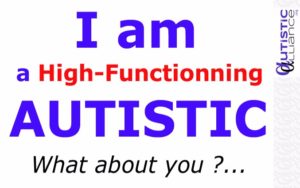
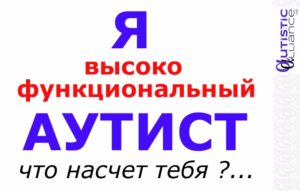
“I am a high-functionning autistic – What about you ?…”
(When you say the things by yourself, then there is no need or reflex to try to hide it anymore, and then people won’t mock you, and it gives an explanation to the “weirdness”, even if they barely know what autism is. (I can explain better.))
I showed him that he should not be impressed by people, because most of the time they don’t think that much (like him), or they barely understand what is outside of their little “box” (their life and their routines), so why being impressed and scared by what they think about us? Especially when there is no chance that they will be able to understand the underlying motivations for what we are doing (for example, if they do not understand autism, which is the case for at least 99.9999% of the inhabitants of the planet).
(We showed pictures of “crop circles” to many young people, looking educated, and we asked them what they think about that, and they replied “it does not exist”…).
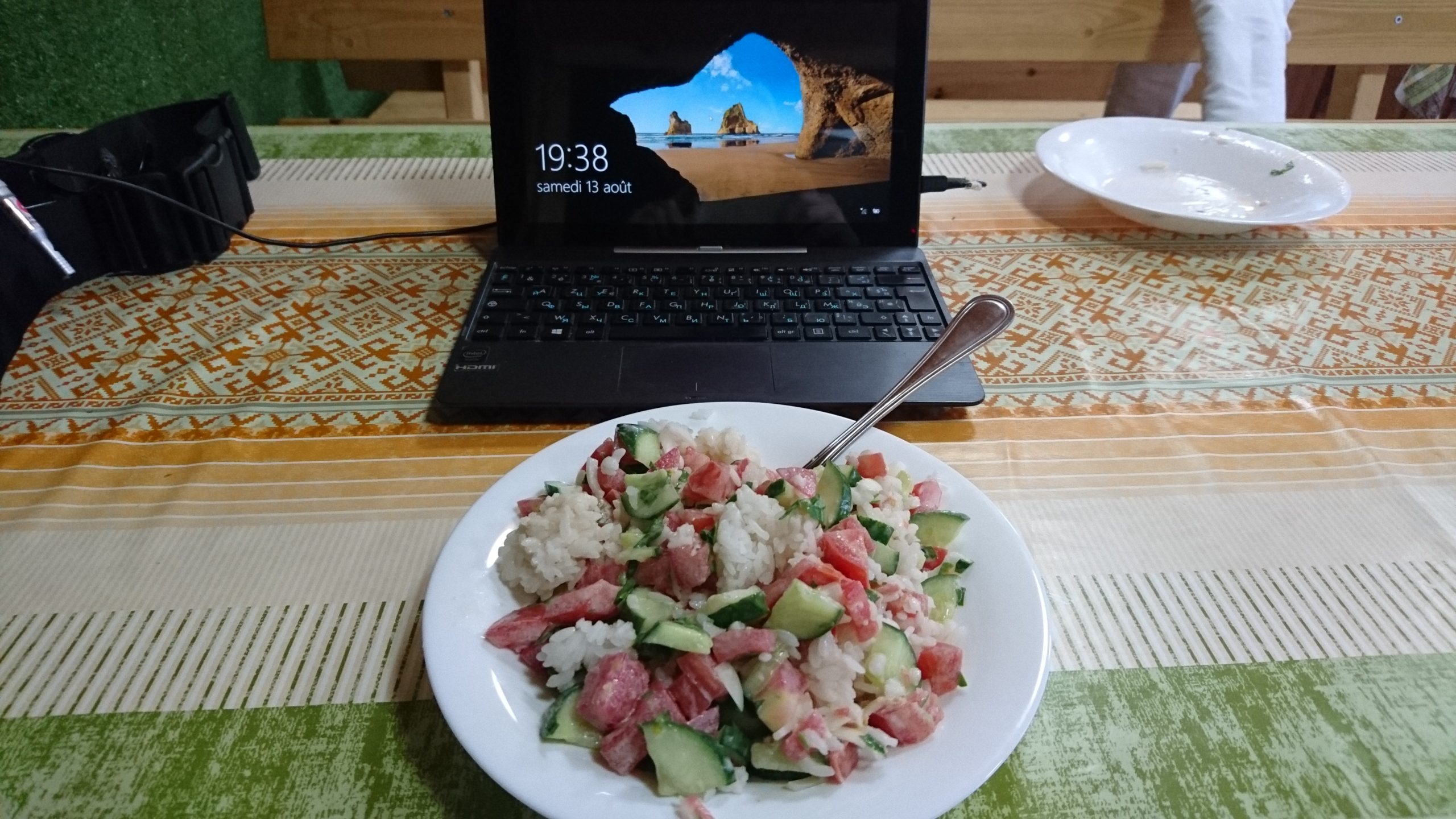
A photo of my “office” (and meal) on the last evening (just after installing the large Autistan Flag on the “little house in the mountain”.
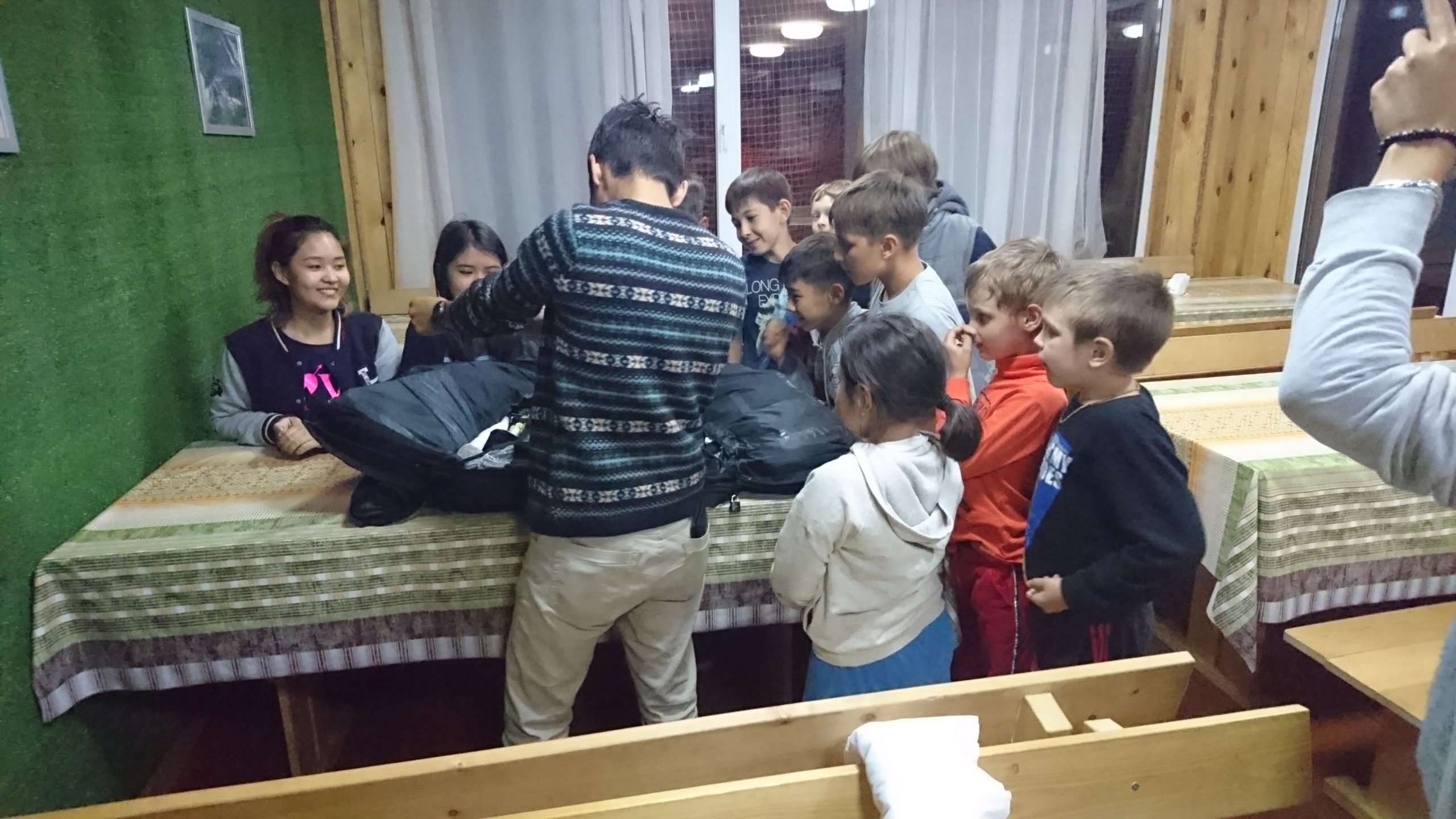
And a monitor tries to give the children a brief and superficial “tour” of my very special jacket (which contains countless pockets and objects, accessories, clothes and useful tools of all kinds).
But that’s another story 🙂
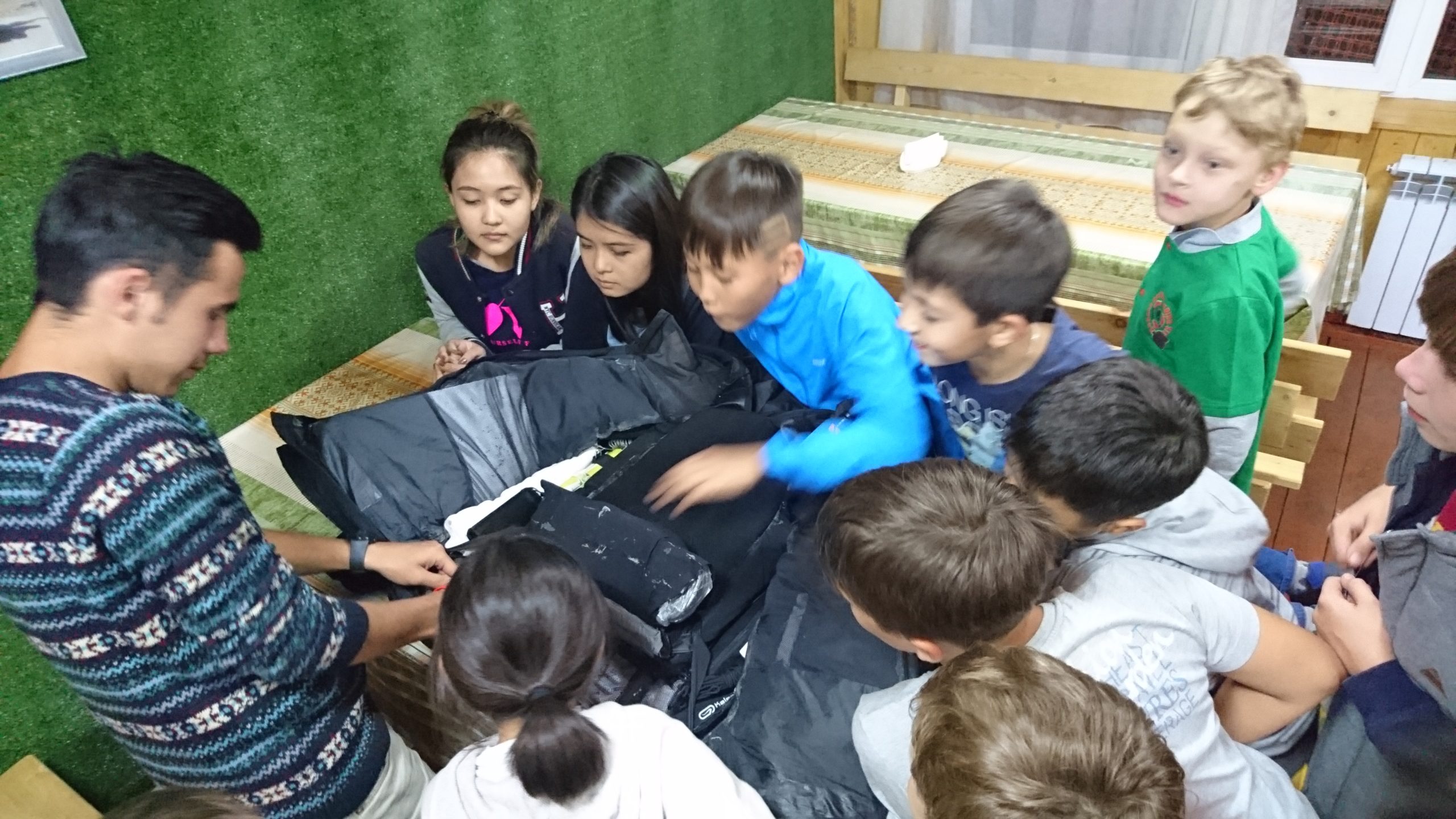
Adventures and discoveries 🙂
Life.
4.5. More daring “social experiments” in Spain with Adiyar
I found that there could be much better progress for him, but in order to do that, he had to really go out of his “comfort zone” (country, language, everything).
So I proposed a short journey to another country. But of course, their were the issues of costs, security…
But once again the “occasions” helped us, by providing a compromise: the family went on holidays in Spain, but they “granted me” one week at the end of august, to try to “unlock” Adiyar even further. (We did not use the word “unlocking”, I use it only now in this report.)
I did this for free (like for the summer camp), but all was paid by the family (including the flight from Kazakhstan to Spain, which was very appreciable for me, given my financial situation, and given that anyway I was going in this direction for my next destinations).
That stay in Spain was indeed much more beneficial for Adiyar than our various “little experiments” of a few hours in Almaty.
It was one of the rare occasions when I could (finally) apply my theories in complete freedom, and it worked very well.
It is essential to be able to work “freely”, otherwise parents will always want to place restrictions that will prevent the essential of what should be done.
Concerning that experiment in Spain, it would deserve a full report, but I will just describe a few points.
It didn’t last one week but only 4 days, I thought it was too little but there was no other choice so I tried to use the time to the maximum.
Since I had explained that it was essential to be really free, Adiyar’s mother, being a friend of Zhanat’s and having seen how things were going at the summer camp, trusted me and booked a place for two people in a kind of youth hostel.
But when we arrived (on July 19), we saw that it was a shared room for 4 people, and it seemed to her that it was “impossible” that her son could sleep in a shared room with strangers. So I gently persuaded her that there was really no problem, explaining that I had travelled like this many times before, and she finally agreed.
When we left, she was worried and she asked us not to leave the hostel during all the stay…
4.5.1. First day (20/08) – Talking to random passers-by, shouting…
As soon as the next morning after our arrival in the hostel, we started to do “social experimentations”.
We went to the nearby city centre, and I asked Adiyar to ask questions (sometimes a bit ridiculous) to people, sometimes to this person or that person, or sometimes to “the first person you meet”, at random, which is obviously more difficult.
Especially since we had to speak in Spanish, but that’s not the main problem.
However, at the beginning of the first day, things were not so easy, and sometimes Adiyar refused to do what I asked him.
So I thought about it, and I adapted myself, i.e. I suggested that he prepare some “exercises” by himself, writing them on a paper in advance, and it worked much better, he was much more motivated.
But it was still useful to show him the principle at the beginning: the fact of entering into communication with strangers, to talk to them about things that are not necessarily easy.
It would be difficult to list everything we did, but here are some other examples.
Be warned: these things are sometimes a little but “crazy”, but it was necessary to do them, to “break down mental barriers”, in order to understand that all these things (and many others) are possible, that they are not that difficult, and that “the world does not fall apart” because of that.
For example, to go beyond the experience of asking questions to strangers, I started to say hello to ALL the people I came across, and then, soon after, Adiyar did like I did. Obviously, we were taken for crazy, and so what? Nothing.
This is what I wanted to show.
And these are not things that can be demonstrated or understood in conferences, you have to do them yourself, to see that you can do them.
Probably, Adiyar would not have agreed to do these things in his city, in his country, because of “reputation” problems for example. But here it was much easier.
For that first day, I took very few photos and only one video, because the experience was starting and it was already difficult enough, especially when Adiyar refused to collaborate during a while, so recording things would have made them even more difficult and it would have blocked everything.
We were doing a bit of “sightseeing” at the same time, and I never missed an opportunity, while doing “normal tourist things”, to initiate “social relationships” with anyone (shop assistants, passers-by, etc.), as much as possible by posing for pictures. ), by asking funny or absurd questions, which allowed to “relax the atmosphere” progressively, because Adiyar could see that even when I was doing “a bit of nonsense”, it didn’t lead to any disaster, but only to indifference or smiles (not necessarily mocking, because people often “got into my game”).
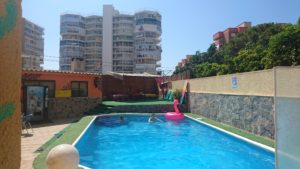
The hostel’s swimming pool, where Adiyar went, which also allowed him to “immerse” himself in the collective atmosphere of the hostel, i.e. by doing what other holidaymakers do.
(When you are autistic, you tend to think that these “normal things” are for others, and you don’t dare to do them. But if, thanks to someone, you are pushed to do them, then you feel much more comfortable and it reduces the social barriers with the other people present (since you do as they do, they see you as “like them” (and not as “strange people”) and so it is easy to communicate simply).
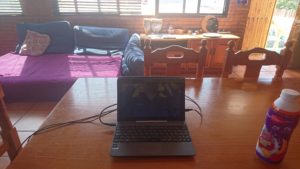
The common room (with my little computer). Here we chatted with other residents, had a long and friendly conversation with a young woman from Argentina, and even more or less played with them by asking questions like “How does it feel not to be autistic?
Most of our questions were inspired by the superficial, futile, sometimes derisive or absurd side of “social conventions”.
For example, we could assume that it was absolutely necessary to say “good morning” to everyone we met, with the idea that this would make their day better, which is obviously absurd, so we quickly changed “Buenos dias” to “Buenos Aires”, to make it sound even more absurd, but often people didn’t even notice the difference and replied “Buenos dias” to our “Buenos Aires”.
We even complicated this game by saying “Montevideo” (to say hello), but it didn’t work so well :-).
On the first evening, late at night, passing by a place with a lot of big residential buildings, continuing the “hello said to everyone” experience, I asked Adiyar to shout “good night” very loud, but anyway we were quite far from the buildings, so we could not annoy anyone. We could only have been mistaken for crazy or drunk by the few people who passed by to walk their dogs.
At first he didn’t dare, or he screamed but really not loud, as if he was saying goodnight to someone 10 meters away. So I set the example, I shouted loudly.
And what happened? Nothing, absolutely nothing … (see the short video below)
There wasn’t even a window that opened, or a light that came on, yet it was past 10 or 11 p.m.
Then I screamed even louder, and so did he.
It is certain that he never imagined that he could do this one day (and he confirms this at the end of the clip).
20/08 – We start to shout “good night”, quite far from the buildings. In the end, Adiyar tells me that he never imagined that he could do this. But this was just the beginning…
It may sound ridiculous, but the bottom line is that it is effective.
Then we would each try to scream louder than the other, but, well, I was the winner 🙂 However, he was really screaming the loudest he could, and I was cheering him on, kind of like in a sports training (or in the army …), and little by little he ended up shouting even louder.
And there was still no reaction in the windows.
The world still wasn’t falling apart …
So, several nights in a row, we had the same experience, but with other buildings much less far away, and nothing ever happened.)
Sure, maybe we were bothering, and there was a bit of a disrespectful side to those actions, but in this case, if people were bothered, they could at least show up to their window, and we would have stopped.
At the beginning, Adiyar was reluctant, then he agreed, then he found it funny (and you can see that in one of the videos at the end of the stay).
4.5.2. Second day (21/08) – Various things
This experience of “shouting ‘good night’ very loud” at night was a really important starting point (but all the other “little” steps, including in Almaty, had been necessary), because from there Adiyar was much more relaxed. and more self-confident.
At the youth hostel, he was also able to chat with other travellers. It would take too long to detail, but it was very interesting for him and I saw that it was opening. The discussions between the travellers were so natural, hence he quickly did the same.
He was also very surprised to find that the other people in our bedroom were girls, but, as always, there was obviously no problem.
On the second day, we went sightseeing in the big city nearby.
I recorded very few things, but I proposed to Adiyar to go on the merry-go-round, which was a bit embarrassing since it’s for children, but we were there for these “difficult” experiences, and given all we had already done the day before, Adiyar could see that it was no problem and that “people” really didn’t pay attention to what we could say or do, even when we said “Buenos Aires” (or, worse, “Montevideo”) to say hello.
(Autistic people often tend to notice small details, especially inconsistencies, so for us it’s always very hard to imagine that “normal people” wouldn’t pay attention).

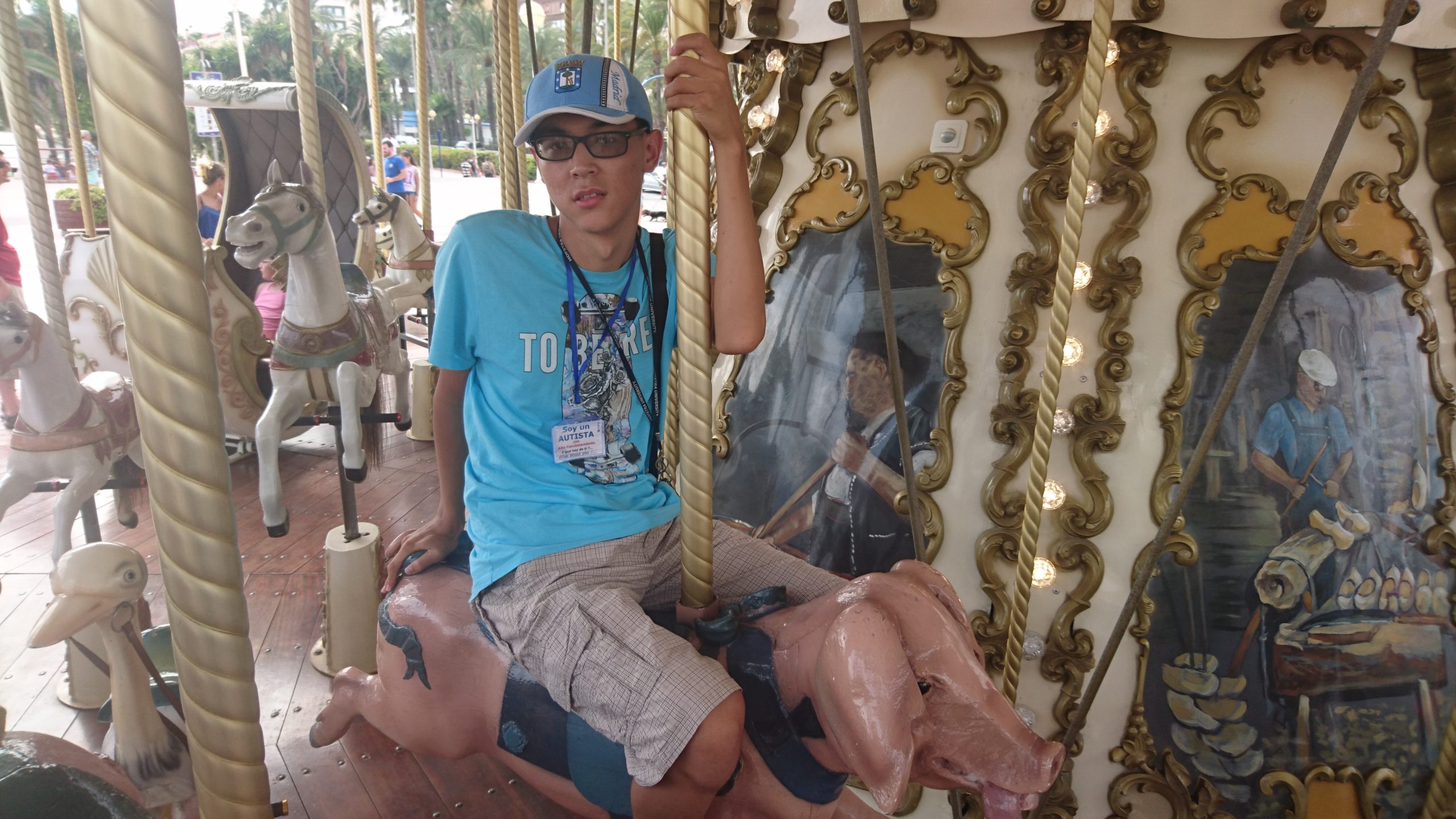 21/08 – Adiyar on the merry-go-round
21/08 – Adiyar on the merry-go-round
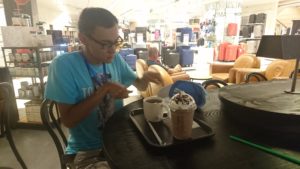
In a (sort of) StarBucks café
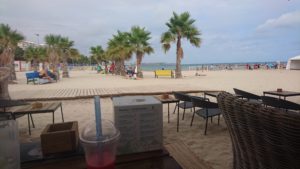
At another café on the beach
We did not drink any single drop of alcohol during the whole stay, me I almost never drink (i.e. accidentally and very few, perhaps the equivalent of one teaspoon of pure alcohol per decade (10 years))), and for Adiyar I assume it’s the same. Why drinking alcohol ?… Or smoking ?…

Here we tried to cook rice at the hostel. It was eatable :-).
4.5.3. Third day (22/08) – Shouting, singing, playing plastic guitar, etc.
We only had 5 full days, so I wanted to go fast and strong.
I didn’t want Adiyar’s mother to be disappointed.
So the idea was to do quite “extreme” things as quickly as possible (but obviously never dangerous), and on the principle that if you can do “very strong” (or very difficult) things, then it is easy to do “ordinary” things.
It was therefore a kind of “express” training, very intensive.
And besides, it was completely improvised.
I didn’t have a specific plan, I just had my understanding of autism, and my personal life experience.
Then, I let myself be guided by inspiration, by Adiyar’s preferences (or difficulties), by the environment, accessories, people’s reactions … That’s life, you have to adapt . We simply “provoked” in 5 days situations of an intensity that would perhaps have taken years for Adiyar, with his usual life well regulated and defined.
22/08 – Another exercise in shouting, this time closer to buildings, and in daylight, so more difficult.
As we were tired of saying “buenos dias” at least 100 times a day, we switched to a funnier version consisting in saying (and, here, shouting) “Buenos Aires” (the capital of Argentina).
Adiyar starts to shout louder, i.e. to be less embarrassed.
The aim was not to learn how to shout loudly, but to overcome what we believe to be personal limitations.
22/08 – Here we went to a place far from any habitation, to practice shouting as loud as possible (without disturbing anyone and without fear of ridicule).
We shout “Buenos Aires” and then “Buenos dias”, and then we have a contest to see who can shout “aaaaaaaaa” the longest time…
Another example of “crazy things” that we did, was begging…
An experience that was certainly unimaginable before for Adiyar (but I already had the experience, because of France).
It was still a very difficult thing at first for him, given his social background, but it is important to learn “social humility”, or at least to try to take on this role.
It was obviously not for the money.
But the attitude of people is not at all the same when you introduce yourself to them asking for money. They are generally quite cold, so it is obviously a difficult experience.
We did not do that for long, because I saw someone selling a plastic guitars (costing 5 €), so I bought one, and Adiyar pretended to play the guitar, singing (in Russian), and I was asking for money for the show (and to feed a little lamb that I had in my hand…).
And people, who wondered if it was true or some kind of “student joke”, sometimes donated money.
It’s a very strange form of “social relationship”, of course, but it is nevertheless “rewarding” because we see that we can do things, unforeseen, difficult things, and that it works.
So then, if you can do something so difficult and ridiculous, the rest is easy.
22/08 – Translation :
– “Music please… This is a little animal [the little lamb], which has been abandoned, and who is starving, and this boy is very kind, and I hope that you understand Spanish…”
– “Yes, a little bit…”
– “Which country are you from ?”
– “France”
(Then I translate in French for this man. He mentions that the animal is in fact a lamb)
– (in French) “This little lamb is hungry and this is a very sad story”
(Then I mix various languages)
– “And my friend Adiyar is about to sing a little song” (the man helps me to translate…) “in order to give a little bit of food for that lamb”
– “Can you give 50 cents ? It’s just a joke. And he will sing for you.”
The man gives some money, I say “Fantastic”. He is cool and asks some kind questions.
Adiyar (very bravely) sings a typical Russian song.
I help him to play guitar, all that is completely improvised and, of course, not serious at all.
I explain that we will buy sausage for the lamb…
Then the man explains that he found the money on the beach with his metal detector.
I say that it’s a nice story because the lamb will eat the food bought with the money coming from the beach (which is similar to eating the grass from a field).
The man says “You must say thank you to the tourists” so I immediately take it literally and I shout “thank you to the tourists”, then I ask to Adiyar to do the same and he does it, and of course they barely notice, then we say thank you to all the people we come across, and “God bless you” and so on”.
And then, to Adiyar : “So, you see, it’s very easy”, he laughs and says “Yes, it’s very easy”.
Then we continue to say “muchas gracias” to anyone, and we laugh 🙂
22/08 – A little exercise to practise shouting loudly, i.e. to be more self confident.

That evening, I had received my special jacket, which I usually carry as checked luggage on the plane (hold luggage), which had been misplaced by the airline and was delivered to me after 3 days.
(This means that I lived for 3 days without any luggage, except for the most essential things in my trouser pockets, and my small computer in a very small bag).
4.5.4. Fourth day (23/08) – Controlling the tram passengers tickets
On the that day, the most difficult thing we did was in a tram.
In fact, it was not exactly “we”, but “me”, because Adiyar was just following me and observing, not really participating, given that I could not ask him to do something so daring.
As always, I followed my inspiration, and came up with the idea to start checking passengers’ tickets!
I just wanted to show him an example of something “extreme”, not to make him do things like that, but to make him see that it is possible to do that without the world falling apart, and that at the end of the day we can go to bed exactly as if nothing had happened.
In other words, I took some (limited) risks, but only for me, not for him.
It was obvious to me and to Adiyar that this was a joke, as we had no uniform, no badge, no special card…
So I started walking in the tram saying very seriously “tickets, please”.
And, surprising as it may seem, one after another, the passengers all showed their tickets.
Adiyar was following me closely, not showing his feelings (which must have been, at first, amazement, then disbelief, then a strong desire to laugh).
We couldn’t laugh because that would have “broken” the principle of that “game”.
However, after about ten checks (which I simulated because I had no idea what the tickets or cards presented meant), I found that it was too easy, so I started to “complicate the game” more and more.
For example, from time to time I spoke with Adiyar in English, in a way that was really not normal for a controller.
Why would a Spanish inspector speak English to a young foreigner who was following him during his inspection?
As I update this article, I realise that it is not impossible, for example with a trainee in an international cooperation, but I assure you that in practice we were really not credible, neither as a controller nor as a trainee: we were dressed really like tourists (Adiyar had Bermuda shorts, we had bags of our purchases from shops in the centre of town, and the only badges we had were “I’m autistic”, which is another proof of the fact that people really don’t pay attention).
What I wanted to show Adiyar was that not only “the world was not falling apart “, but that people don’t really care, and that they are not as ” hostile ” or ” dangerous ” as one might imagine.
(This is a lesson I learned about twenty years ago, while doing funny “petitions for the children of Greenland who are freezing to death”, and which was only the beginning of many other personal experiences that helped me overcome my “fear of people”, and which I can explain and even have on video).
From the second car onwards, things were really too easy, we couldn’t stay that serious, especially as there was always a risk of problems or complaints, as people hadn’t seen it was a joke, and could therefore legitimately talk about usurpation.
So I became much more relaxed (but it all happened naturally and instinctively, it wasn’t programmed), and I started to make funny but non-mocking comments, for example looking at a picture of a lady’s face on her transport card, pretending to be suspicious, and I asked (in English!) Adiyar what he thought about it, and he replied (also in English)….
Controllers” without at least a uniform or otherwise a badge, and at least one of whom is obviously a foreigner, is really nonsense, and people should have started laughing, but no …
Yet this lady was smiling, and I don’t know if she understood that it was a game.
Then, as most people continued to submit obediently to this “control”, I went even further, and continued the control but speaking only in English 🙂
Since when do Spanish controllers ask everyone for tickets in English in Spain?
From then on, many people continued to show their tickets, but a “reassuring” number of people laughed and didn’t show anything at all (and we didn’t insist on them, of course).
I think we “checked” all the cars like that.
It was completely surreal.
But it showed that we could do ‘extreme’ things, and that the world was still not collapsing.
However, it would have been difficult to do anything more “extreme”.
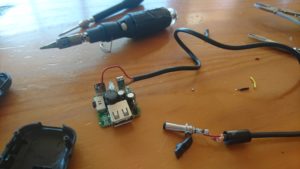

As I had received my tools (contained in my jacket), I was able to do a little tinkering to be able to charge my shaver on a USB plug in the future.
(This has nothing to do with the present article, but usually when I tell my stories about the jacket and the DIY, people find it “interesting”…)
4.5.5. Fifth day (24/08) – Dancing, nonsense songs and conversations with random tourists, and so on…
On the fifth and last day, “the world having still not collapsed”, I decided to try and do “the maximum”, but without any risk of getting into trouble, given that the day before, we had already seen the “red line” from very close (and this is also a useful thing to know).
We went to a touristic place where there were a lot of people, not far from the beach, and we did all kinds of things, jokes, and even nonsense or silly things (neither mean nor dangerous of course).
The experience of “saying hello to everyone”, which had seemed “impossible” a day earlier, had become quite ordinary and easy, and of no interest to me or him.
It was therefore necessary to “innovate”, with a certain dose of imagination, and sometimes daring.
We’ve done so many things which were “little crazy” that it would take too long to tell, but here are a few examples.
We used jokes or stories known to the Spaniards, but in very unusual situations, for example if when entering a store a salesman came to ask us if we wanted information, I kept a very serious air, I answered that yes, and I immediately asked him what happened to the tail of the dog of San Ronque … 🙂
Since this story is known there, the salesperson would smile (or laugh), and give the answer.
(In this “tongue twister”, a certain Ramon Ramirez has cut the tail of that poor dog …)
And then Adiyar did the same in other stores (which was still quite difficult at first, ie. having to look serious when doing something both funny and inappropriate).
Often, autistic people (and not only them) are afraid of ridicule, of people’s reactions …
In France, there is a saying: “Ridicule does not kill” …
And I would add the famous adage from Nietzche: “What doesn’t kill me makes me stronger.”
From this, the number of “unusual”, “ridiculous but not dangerous or forbidden”, or other things that it is possible to do is almost endless.
So in a touristic place, in the evening, when people are walking, in the summer, on vacation, when they are relaxed and open to new or funny things: the situation was perfect, especially since we were strangers here for only a few days (so no “reputation” issues).
Even though we were looking ridiculous (or maybe looking drunk), and so what? What could happen?
At the end, seeing people dancing in front of a restaurant, I asked Adiyar to go dancing and singing with them, playing guitar and he did it!
So we were a long way from the early days in Almaty, where just going to ask the time was really difficult and could take 20 minutes of preparation and persuasion.
During all these experiences, Adiyar was always a little reluctant and puzzled, but at the same time I could clearly see that he was more and more relaxed and that he was having more and more fun.
24/08 – Here we see people dancing so I ask Adiyar to go and dance with them (even though we are not part of the restaurant’s clientele), and, now always quite valiant, he goes and dances, then he pretends to play the guitar, then I ask him to sing, and we sing a very improvised song we had made (in Spanish) which explained that we were not Martians and that we did not like Martians (i.e. a highly intellectual and very instructive song :-))
(I have removed the parts in the videos where we were singing on that day, because it was particularly awful when I was singing 🙂
24/08 – Here it’s full of nonsense things about not being a Martian, being crazy and so on.
For example, I explain to English-speaking tourists that I’m not a Martian but I’m crazy.
And there is no problem. And I tell them “sleep well”, and I add that they have to sleep well, i.e; that is it a sort of “obligation”.
In fact, throughout our stay, we had a lot of fun with the absurd aspects of social conventions and formulas of politeness, and this is important because it allows one to ” put things into perspective “, i.e. to better understand that the ” normal ” views and habits are not so righteous.
I won’t write the rest of these “dialogues” here, because it’s really nonsense (but funny and harmless).
At the end, we shout again under the windows of a residential building. Adiyar even says good night to the Martian tourists supposed to live there… 🙂
And he laughs because we can do any silly thing and talk, sing or shout about anything (serious or not) in any language and in fact there is no problem at all…
24/08 – This is the last video and we say even more absurd things to people, we look drunk, but – as already said – I assure you we haven’t had a single drop of alcohol.
Being aware of this risk (of appearing drunk when the video is viewed), I immediately switch to a more serious conversation.
Then, seeing a tram coming, I switch back to “delirious” mode, assuming that I absolutely must say goodnight to people, then “bless them” etc.
And we switch back to a serious conversation.
It’s all very easy: you just have to decide to do it, and not be “enslaved to the (potential) judgment of others”.
Adiyar was discovering that dealing with people is much easier than he imagined.
That you just have to start, take the first step, even in an awkward way, and that even if you are wrong or if you are ridiculous, it is not the end of the world, you do not die of it, and in reality people don’t really pay attention and it doesn’t matter. In other words, it has only the importance that you think it has…
The only difference is that “before” (this understanding) one can do almost nothing, and “after” one can do almost anything (as long as it is not dangerous, disrespectful or illegal).
And it’s called freedom 🙂
I believe that if Adiyar’s mother had been there she would not have liked those things, and she would have opposed them. Yet it is evident that it was useful, and we were there to make “new things”. All that could be done in the familial environment (at that time) had certainly been done already.
In the months that followed, Adiyar sometimes sent me little messages about his successes, such as friendly meetings…
4.5.6. Sixth day (25/08) – The bus
On the last morning, there was the story of the bus.
Adiyar was to return to his family, 30 km away.
But he thought he was going to take a cab.
I told him that the taxi for 30 km was very expensive, and that there was a bus that went not far from his destination, which was much cheaper, but he replied that it was not a problem and that he didn’t want to take the bus and had never done so.
I found it to be an interesting last experiment to do, since he had never done it before.
I don’t remember how I managed to convince him, but eventually it was decided that he would take the bus. He was not happy …
But I was there to do “my job”, not to do easy and usual things.
In addition, once we arrived in the city center, as we had difficulty finding the bus station, I asked him to inquire himself with passers-by, and he firmly refused.
So I sat down quietly, and waited …
He was pretty upset, and he was asking me to find the bus station, but I didn’t move and told him that after all the hard things we had done, he could do this last little exercise. It was almost like a final test …
If after 4 days he wasn’t even able to ask for such simple information, how would all this “training” have been useful?
So finally, reluctantly, he went looking for information, and he found it. I was sitting there waiting. He then showed me where this station was (a few hundred meters away).
Then, again, I asked him to buy his bus ticket himself, which he didn’t want to do at first, but he did it anyway: he had no choice, he could see that I would remain inflexible. And as I am not his father or his mother, there was no “sentimental” question that could have come to “intercede” to do things for him, to “protect” him from whatever.
Which ultimately – even with benevolent intentions – ws reducing his chances of learning autonomy.
Even if from that moment, maybe he never took the bus again, this little experience was also useful to take the plane without needing assistance.
So that’s what happened. In my opinion, it was very successful.
We could have had many other experiences, not stronger, but more diverse, especially in “serious” relationships with people (because jokes were enough). It would have taken longer. But these 4 days were used very well, and I am sure that it allowed “unlocks” and “learnings” which, later, are useful during all the life because they allow to pass to more difficult stages, and so on. following.
Indeed, once we see that it is possible and easy to move forward, we are no longer afraid to move forward, and then almost anything becomes possible.
We had to prove it by example: that’s what I did for Adiyar, and that’s what he proved to himself.
(Note from 2021: Later, in Brazil, I offered my help to dozens of families I encountered more or less randomly, but they almost all refused. I never understood why and it’s a pity, especially since the families are constantly asking for help: they are offered a very rare and efficient (and free!) help, and they don’t want to try, at least…
It’s very sad for those children, I’ve seen some of them for several years, who don’t evolve (or who evolve badly, for example, only by getting bigger), when it would be so easy, and we would see significant results in less than a week of “unblocking”. The absurdity and frustration here is almost torturing…
Only two families have accepted my help in 5 years (for a 14 year old child and a 48 year old adult), but in each case it was almost impossible to do anything because a parent (father or mother) was nearby (which in itself is not a problem) but was opposed to anything “not like usual”… In the end, I was almost babysitting, and it was a complete waste of time. I tried to explain to the parents that if they wanted to see changes in their child, they had to change something, i.e. do new things, but they didn’t want to hear me. Sometimes I even told them about these experiences in Kazakhstan (or in Spain with a young Kazakhstani), but it didn’t change anything. Maybe they didn’t believe me…. Or maybe they “know better”…
So, for the last two years or so, I’ve been making efforts to suppress the reflex to help people… I avoid parental groups or forums, since I know that I won’t be able to stop myself from offering help, and that the few who respond won’t want to do anything I suggest. And they will continue to implore for help, and to pay “professionals” or to look for miracle “treatments”… While they are using binoculars the wrong way, as already explained. Some good professionals can be useful, but what I propose is different.
And in France, I stopped trying to offer help very quickly, because I was immediately confronted with suspicions or accusations, made without ever checking or trying anything.

